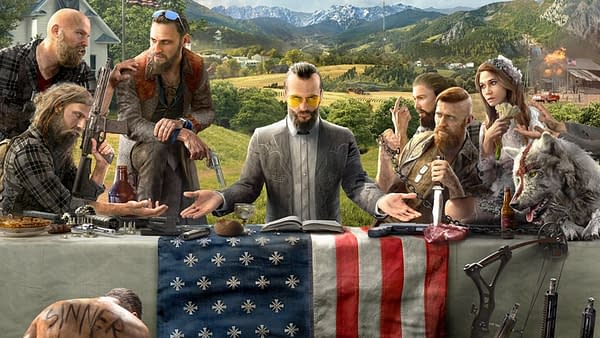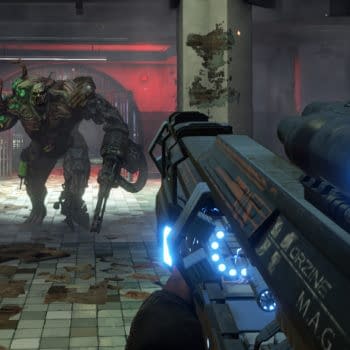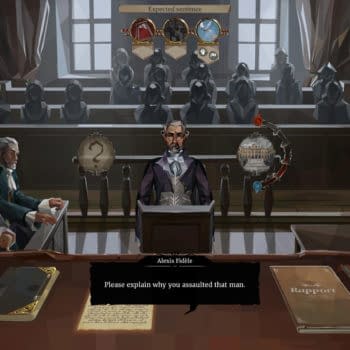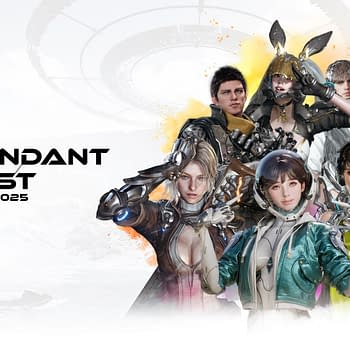Posted in: Games, Video Games | Tagged: activision, Call of Duty: WWII, David Cage, Far Cry 5, HRL, Quantic Dream, ubisoft
Should Games be Held Accountable for their Moral Implications?
This comes up often with games, especially when you consider them in a broader cultural context. Should game developers worry about the moral implications of the events portrayed in their games?
We've previously discussed Far Cry 5's impact on the current white supremacist problem in the United States, as well as how Ubisoft could have done something interesting with the citizens of Hope County, but ultimately failed at doing anything but portraying the same casual right-wing philosophy that they always do. Sure, there's nothing wrong with being politically conservative — as long as you don't use your politics to cause harm to other people. I draw the line at lynching, gay conversion therapy, and using religious beliefs to prop up anti-women, anti-POC, and anti-immigrant legislation. I've also got some strong opinions on gun control. But you can be a conservative person and still not be a dick. The problem is the extreme way Ubisoft goes about their ideology.
Even when trying to portray diverse environments with diverse protagonists like in Far Cry 4, or trying to embody the spirit of the American Revolution in Assassin's Creed 3, Ubisoft has a distressing tendency to punch down at the easy targets. Ghost Recon: Wildlands centered its entire plot on the idea that Bolivia, as a South American country, was a haven for drug cartels. Naturally, that didn't sit will with the country of Bolivia, and the game's white savior narrative was a major turn-off while playing the game. It's had some limited success despite all that, however.
Far Cry 5 did pretty well at launch, though fondness for the game is sizzling out pretty quickly.
This isn't just a problem with Ubisoft either. David Cage and Quantic Dream's Detroit: Become Human has raised eyebrows for Cage's actions and the boys club environment of Quantic's headquarters. Cage's games also have a distressing tendency to sexualize violence against women.
Nor is it just a French thing. Activision decided to include the Holocaust into a WWII game for the first time in Call of Duty history, but did so with three sentences in an epilogue. As if the loss of 7 billion people due to genocide was just a footnote. Which, when it comes to the moral implications of a game, is incredibly horrifying. And it probably helps explain just how little modern America remembers the Holocaust.
Now, some gamers like to pretend that games are apolitical. I've made the argument before that, because gamers exist in countries, games are inherently political objects. Simply by virtue of being sold in a world with politics makes them politically relevant. Of course, that's more true for some games than others, but all art is political. And we've made a point of insisting games are art. Because they are. Thus, they're political.
Games have also been used as political punching bags – a way for a reactionary government to shift the blame when it comes to acts of mass violence. And games have been banned in certain markets because of their content.
In periods of instability, art becomes much more politically pointed. Games are no exception to that. And games are only getting more and more political as the world dynamic shifts.
We hold movies and TV up to their own moral codes at times. We applaud Netflix for getting rid of accused child molesters and rapists. We relished the fall of Harvey Weinstein and the Hollywood Renaissance its brought thanks to the Me Too movement. Many film critics refuse to see Woody Allen's films. The success of Black Panther has made it a massive win for the black film industry and set a bar for mainstream movies to be much more inclusive in terms of representative casting. Even #OscarsSoWhite trended last year for a reason.
As for their content, well, that comes under scrutiny just as often as the real-world tie-ins — at least when it comes to film and TV. With games we really only get the internal content, most of the time. Its not like we can sit around talking about game developers by name outside of a small handful of influential game directors.
Visual art is also held to those same standards. We've also seen visual art be used as a political tool, with former President Barack Obama and former First Lady Michelle Obama commissioning their official portraits by black artists as a statement about the overwhelming whiteness of presidential portraitry.
If we expect more of our film, TV, portraits, sculptures, and plays, shouldn't we do the same to games?
Neither Far Cry 5 nor Ghost Recon: Wildlands were top-performing games following their respective releases. Sure, Wildlands did well for a short time, but it released in the relatively dry games release window of February 2017. And Detroit: Become Human isn't exactly gearing up for a smooth launch.
You could argue that we've already started holding games responsible for their moral implications. However, I think we're just beginning, and we ought to go further.





![[REVIEW] "Gang Beasts" is Zany Party Madness](https://mlpnk72yciwc.i.optimole.com/cqhiHLc.IIZS~2ef73/w:350/h:350/q:75/rt:fill/g:ce/https://bleedingcool.com/wp-content/uploads/2019/09/gang-beasts-7-350x350.jpg)




![[REVIEW] "Divinity: Original Sin II" Definitive Edition is Almost Perfect](https://mlpnk72yciwc.i.optimole.com/cqhiHLc.IIZS~2ef73/w:350/h:350/q:75/rt:fill/g:ce/https://bleedingcool.com/wp-content/uploads/2018/08/Divinity-Original-Sin-2-Definitive-Edition-art-350x350.jpg)





